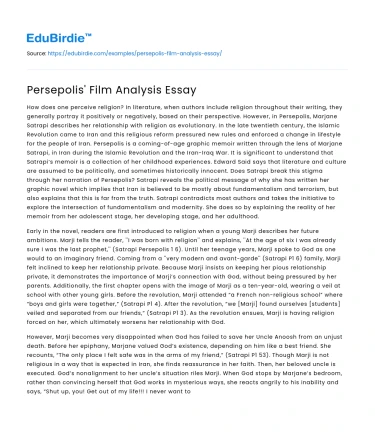How does one perceive religion? In literature, when authors include religion throughout their writing, they generally portray it positively or negatively, based on their perspective. However, in Persepolis, Marjane Satrapi describes her relationship with religion as evolutionary. In the late twentieth century, the Islamic Revolution came to Iran and this religious reform pressured new rules and enforced a change in lifestyle for the people of Iran. Persepolis is a coming-of-age graphic memoir written through the lens of Marjane Satrapi, in Iran during the Islamic Revolution and the Iran-Iraq War. It is significant to understand that Satrapi’s memoir is a collection of her childhood experiences. Edward Said says that literature and culture are assumed to be politically, and sometimes historically innocent. Does Satrapi break this stigma through her narration of Persepolis? Satrapi reveals the political message of why she has written her graphic novel which implies that Iran is believed to be mostly about fundamentalism and terrorism, but also explains that this is far from the truth. Satrapi contradicts most authors and takes the initiative to explore the intersection of fundamentalism and modernity. She does so by explaining the reality of her memoir from her adolescent stage, her developing stage, and her adulthood.
Early in the novel, readers are first introduced to religion when a young Marji describes her future ambitions. Marji tells the reader, ''I was born with religion'' and explains, ''At the age of six I was already sure I was the last prophet,'' (Satrapi Persepolis 1 6). Until her teenage years, Marji spoke to God as one would to an imaginary friend. Coming from a ''very modern and avant-garde'' (Satrapi P1 6) family, Marji felt inclined to keep her relationship private. Because Marji insists on keeping her pious relationship private, it demonstrates the importance of Marji’s connection with God, without being pressured by her parents. Additionally, the first chapter opens with the image of Marji as a ten-year-old, wearing a veil at school with other young girls. Before the revolution, Marji attended “a French non-religious school” where “boys and girls were together,” (Satrapi P1 4). After the revolution, “we [Marji] found ourselves [students] veiled and separated from our friends,” (Satrapi P1 3). As the revolution ensues, Marji is having religion forced on her, which ultimately worsens her relationship with God.
Save your time!
We can take care of your essay
- Proper editing and formatting
- Free revision, title page, and bibliography
- Flexible prices and money-back guarantee
However, Marji becomes very disappointed when God has failed to save her Uncle Anoosh from an unjust death. Before her epiphany, Marjane valued God’s existence, depending on him like a best friend. She recounts, “The only place I felt safe was in the arms of my friend,” (Satrapi P1 53). Though Marji is not religious in a way that is expected in Iran, she finds reassurance in her faith. Then, her beloved uncle is executed. God’s nonalignment to her uncle’s situation riles Marji. When God stops by Marjane’s bedroom, rather than convincing herself that God works in mysterious ways, she reacts angrily to his inability and says, “Shut up, you! Get out of my life!!! I never want to see you again! Get out” (Satrapi P1 70). Marji’s outburst towards God leads to the sudden end of their friendship and the beginning of her isolation. Her devastation towards the execution destroys her previous aspirations. She cannot forgive the regime for the injustice, and she cannot fathom that her best friend, God, let him die. The reader can interpret her frustration as a little girl realizing that what she idolized, was a lie.
While studying abroad in Europe, Marjane slowly goes back to her religious roots. Marjane had to attend school in Europe after her parents became concerned for her safety. While studying, she found it difficult to fit in, while maintaining her grades. During her last year of school, and to her surprise, God helps her with the topic of her essay. Shaken, Marjane asks her mom to pray for her. She narrates, “Each time that I asked my mother to pray for me, my wish was granted,” (Satrapi Persepolis 2 69). After Marjane got her topic, she prayed for a good grade. Stunningly, Marjane got the highest marks in her grade. This signifies Marjane rekindling a relationship with God after the heartbreak she endured as a child. After Marjane finishes school, she returns to Iran. Struggling with the memories of watching dead bodies in her childhood and the trauma of being homeless, she becomes depressed. Eventually, she makes a suicide attempt on prescription pills. Once she wakes up, the doctor informs her, 'That dose should have been enough to finish off an elephant! … Even though I'm not a believer, aside from divine intervention, I can't find any other explanation for your survival,' (Satrapi P2 119). Marjane establishes the doctor’s use of the words “divine intervention” as evidence to why she survives. She uses her faith to realize that she wasn't meant to die during her suicide attempt, and she redirects her energies toward strengthening her identity instead of trying to destroy it.
In Persepolis, Marjane Satrapi defends her ever-changing experience with religion. She implies that there is a line that can be drawn between fundamentalism and modernity however, she clearly states throughout her memoir that they sometimes coincide with one another. Ms. Satrapi breaks the stigma that most authors present in literature by effectively giving readers a chance to learn the same things that she has while maturing. She demonstrates the beauty of faith and teaches her readers why the ideas of Orientalism can be debunked, allowing room for empathy from her readers.






 Stuck on your essay?
Stuck on your essay?

